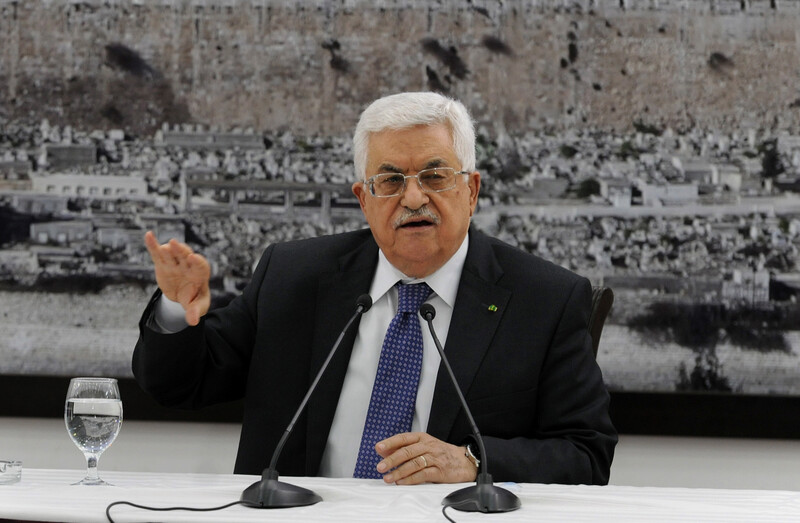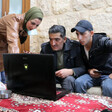The Electronic Intifada 22 September 2016

Palestinian Authority leader Mahmoud Abbas’ Fatah party had more to lose from local elections than rival Hamas.
APA imagesWhichever way you turn it, the municipal elections for the occupied West Bank and Gaza that were slated for October would effectively have been a referendum on the leadership of Mahmoud Abbas and, to a much lesser extent, Hamas.
Perhaps that’s why they were canceled.
Certainly, that was the impression given by the rival parties, Fatah and Hamas, once the Palestinian high court in Ramallah ruled the elections could not go ahead after “procedural hurdles” in Gaza and with Israel preventing voting in East Jerusalem.
Fatah’s Usama al-Qawasmi accused Hamas of deliberately sabotaging the vote with “private courts” to prevent Fatah candidates from standing in Gaza. Sami Abu Zuhri, a Hamas representative, denounced a “politically motivated” court decision designed “to rescue Fatah.”
Of course, the high court would fiercely protest its independence and reject the notion that political pressure had a bearing on the decision. Yet the court cannot seriously be viewed as apolitical, when its judges are appointed by the Palestinian Authority president, a post Abbas has held since 2005.
Moreover, the court’s reasoning that elections could not proceed if they were not held in East Jerusalem did not prevent municipal elections from going ahead in 2012.
At least some political considerations therefore likely swayed judgment.
So what happened?
The elections had been announced in June and, initially, looked set to be a rerun of the 2012 municipal elections which Hamas boycotted. The 2012 vote was confined to the West Bank – excluding East Jerusalem.
But in July, Hamas announced that this time it would indeed participate. It was clear from the moment that Hamas decided to take part that these elections would be about much more than delivering local services.
The vote would have been the first direct electoral contest outside universities between Fatah – in charge of the West Bank’s largest towns, and Hamas, which governs the interior of Gaza, in 10 years. Hamas had won that previous contest, the 2006 elections to the Palestinian Legislative Council.
If this year’s elections had gone ahead, voters would have been allowed to deliver their verdict on the performance of both parties. And in that quasi-referendum, Abbas, heading a divided and discontented Fatah movement, stood to lose far more than Hamas, which is in solid control of Gaza.
Win-win for Hamas?
Hamas played its cards carefully, announcing it would not run as a list in the West Bank but would instead support affiliated or sympathetic independents. A poor showing could be shrugged off. A good result would suggest that had the faction stood on a party list it would have done even better.
It was, said Diana Buttu, a former legal advisor to the Palestine Liberation Organization, a “win-win” for Hamas. Concern about the results of local elections was also, she said, a sign that internal Fatah divisions are now one of Abbas’ primary preoccupations.
“Abbas is worried about Fatah fragmentation and obsessed with the possibility of opening the door for any challenge to his leadership from [Muhammad] Dahlan,” said Buttu, referring to the erstwhile Fatah leader in Gaza who was ousted from the coastal strip after Fatah members there attempted an unsuccessful US-backed putsch against Hamas in 2007.
Dahlan, who enjoys support from the United Arab Emirates and other regional countries, is often cited as the main rival to Abbas and a possible successor despite the fact that he hasn’t lived on Palestinian territory since he was dismissed from Fatah in 2011, and his domestic constituency is primarily in Gaza.
Compounding matters, there has been little renewal within Fatah’s ranks and no elections to the faction’s ruling body, the central committee, since 2009.
“Any ambitious local Fatah leaders have found their path blocked,” said Buttu. “The only way forward was to stand as independents.”
That, however, threatened a repeat of the 2006 elections, when a breakaway faction, al-Mustaqbal (Arabic for “the future”) led by the imprisoned but popular Marwan Barghouti and including several prominent members of Fatah, registered to run as a separate list.
A last-minute compromise was worked out, but divisions within Fatah were all too plain and played into what became a sweep for Hamas.
This time, retribution for abandoning the mothership was swift in coming. Fatah’s central committee had warned already before final registration in early September this year that anyone running as an independent would be struck off the party list.
And a day after the high court canceled the election, Abbas summarily fired two Fatah members in Hebron, former minister of local government Khalid Fahd al-Qawasmi and the deputy head of the Hebron municipality, Jawdi Abu Sneineh, who had put themselves forward as independents.
Faltering leadership
Those were not the only dismissals. Indeed, in the past year, Abbas has removed several officials from their positions, whether in Fatah, the PLO – of which he is also chair – or in PA institutions.
In August, reports surfaced that Abbas had dismissed several members of the central committee. That followed on from the dismissal in April of Nablus governor Akram Rajoub.
And last year, Abbas fired Yasser Abed Rabbo from his position as number two in the PLO.
Such increasingly autocratic turns have come in tandem with polling consistently showing Abbas to be less popular than his counterpart in Hamas, Ismail Haniyeh.
The latest such poll – taken by the Palestinian Center for Policy and Survey Research in June – indicated that Abbas would lose a straight run-off with the Gaza-based Haniyeh.
The gap between the two men had, however, narrowed slightly, when compared to a poll taken three months earlier. In a contest between the two men, 48 percent of respondents said they would vote for Haniyeh, down from 52 percent in the earlier poll. Some 43 percent of respondents said they would vote for Abbas, up from 41 percent a few months earlier.
Nearly two thirds of respondents in the June poll wanted Abbas to resign, while a majority considered the Palestinian Authority “a burden on the Palestinian people.” A full 80 percent believed that PA institutions were corrupt.
But the June poll also found Fatah slightly ahead of Hamas, and that with Marwan Barghouti as leader, Fatah would win a presidential election.
Barghouti, however, remains in an Israeli prison. An aging Abbas is still in power, clinging to a strategy – if that is the right term – of “negotiations, negotiations, negotiations.”
Such negotiations have done nothing to halt the construction and expansion of Israeli settlements and the worsening of Palestinian living standards.
And Hamas? The elections would have marked the first time since 2006 that the Islamist movement could measure itself up against Fatah.
Hamas’ time in charge of the besieged Gaza Strip has been an unhappy one, with three major Israeli military assaults, thousands killed, tens of thousands wounded and made homeless, one of the highest unemployment rates in the world and a UN warning that the coastal strip might be uninhabitable by 2020.
Yet the movement is still able to present a cohesive front, something that Fatah has been unable to do since the 2006 elections. Hamas also has a regional dimension with its affiliation to the broader Muslim Brotherhood, however beleaguered.
Fatah has become a collection of individuals. And Abbas appears to be increasingly fearful that elections will expose this reality.
Awkward questions could also be asked about his mandate to lead – it is 11 years since he was elected president. His term expired in 2009.
October’s municipal elections could have been a first step back into the democratic pool. Some high-level figures in the PA apparatus decided not to go near that pool – perhaps because they feared drowning.
Omar Karmi is a former Jerusalem and Washington, DC, correspondent for The National newspaper.






Comments
Arafat's legacy
Permalink tom hall replied on
Fatah no longer offers even the pretense of resistance to Israeli ambitions, preferring to act (in the form of the Palestinian Authority) as surrogate enforcers for the occupying Zionist army. Having abandoned its former purpose, the organization faces a long slow disintegration unless the dead hand of Abbas and his minions can be prised from its body. Many in Fatah are seeking another direction, but the auspices are not good. The party has lost all genuine popular support, being reduced to an admittedly large but resentful following of families dependent on patronage within a system of racketeering. In blocking all attempts at democratizing the movement while retaining arbitrary personal control over its finances, Arafat ensured that Fatah's future would be one of corruption, collaboration and collapse.
don't kill the messenger
Permalink John Costello replied on
Your charge of corruption is certainly well grounded and of collapse, a simple statement of the inevitable. Of collaboration though; that’s another matter and if you’re aiming at Abbas, or his inner circle then I’d like to know what’s your evidence. Also, you say Fatah has lost all genuine support and is something more like a Cosa Nostra.
While I’ll grant you that there is likely a great deal of nepotism and black marketeering, I have to say though that you and many of our EI comrades seem to expect sweet wine from sour grapes. You, et al, are blaming the victims. How long do you expect the occupation to continue to undermine Palestinian institutions and morale with no affect on the occupied population?
Of course Abbas, cozying up to western power brokers, looks like a shill or puppet but what do you expect? Almost seven decades of denied justice has rendered all of Palestine beggars, pleading for basic necessities or even simple recognition as human beings. It’s much easier to make Abbas the portrait in the attic and preserve the illusion that it's the valiant, righteous indignation of the handsome Haniyeh, that will surely win the day. Of that, I would also like to see your evidence because so far – not so good.
I wonder though and perhaps it’s already been bandied about but what if elections were held now with Marwan Barghouti on the ballot? Wouldn’t this intensify the international spotlight on, not only his imprisonment as a symbol of Israel’s occupation/colonization of Palestine but of the impossibility of Palestinian self-governance under its conditions and over a period of time that now spans what, four generations? And what better way to demonstrate how directly Israel stands in the way of democracy?
I wonder whether Abbas would have a problem with that. My guess is that if it was a united political front and the will of the people, he'd welcome it. Maybe I'm wrong, desperation changes people.
Abbas is accountable
Permalink tom hall replied on
Thanks for the response. Sorry for the slight delay, but someone left a collection of straw men in my yard overnight, and I'm just back from tending the fire.
If you review my brief comment above, you'll note that I did not in fact compare Abbas and company to the Cosa Nostra, nor did I mention, much less endorse Ismail Haniyah and Hamas. Believe it or not, criticism of the direction taken by Fatah isn't an infallible indicator of Islamist sympathies.
You concede the validity of my charge of corruption within Fatah and the likelihood of the organization's collapse, yet balk at the allegation of collaboration. I refer you to Ali Abunimah's column from two years ago, which contains publicly documented evidence of Abbas' devoted service to the Israeli Occupation-
https://electronicintifada.net...
As for the hope expressed in your comment, that Marwan Barghouti (imprisoned for life by the Israelis) run for office, this article mentions his attempt to do so in 2006. He registered his candidacy through a breakaway faction precisely because of opposition from the Fatah leadership under Abbas, who felt threatened by anyone within Fatah calling for resistance to the Israelis.
Finally, your claim that nothing better can be expected of Abbas due to circumstances beyond his control reads like an attempt to absolve him and his leadership of any responsibility for the dire conditions facing the Palestinian people. In fact, Abbas represents only one element in the configuration of Palestinian groups and individuals contending for leadership at the moment. The PA's shameful capitulation before American and Israeli power (and money) was not inevitable. It was chosen by Arafat and his circle-prominently including Abbas- in open contempt of the people over whom they were thereby permitted to wield a policeman's authority.
a change of heart
Permalink John Costello replied on
Tom, I’ve done what never fails to clear the air, I gave your thoughtful words about this issue a chance to work; I slept on them. And although I still think yours and Ali’s and especially Lidia’s judgments are harsh and lacking in empathy, I think you’re instincts are correct. Abbas is accountable for his leadership role and at critical junctures he did concede too much to adversaries who were clearly not going to reward his sacrifices.
Perhaps it’s because of a personal experience that I defended him so. I had a challenge, similar to his, in my own little world. I began a struggle, with my own Quartet, armed with the truth and I too vacillated and conceded and otherwise allowed that truth to become obscured. The results were tragic and very hard to come to terms with. The difference is, apart from scale, that I had no out. Abbas does, he has democracy to turn to.
So I have a little window into Abbas’ dilemma and although his challenges are far greater than mine were, I think I understand how very difficult it’s been for him. But, there are millions of people, young and old, families and future generations, of Arabs and Jews alike, depending on the truth being made perfectly and unbearably clear to the world. Abbas has become mired in 11 years worth of muck and he should make his last act a democratic one.
I just hope that one day when history comes to judge Abbas– like General Pertain –it will be fair.